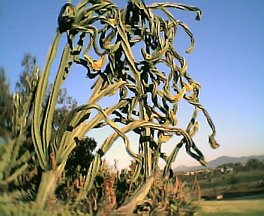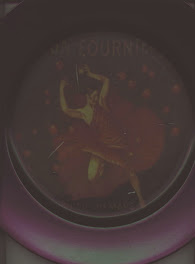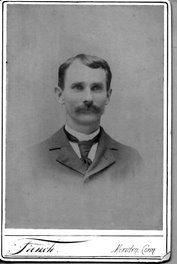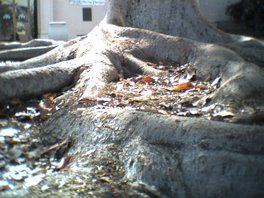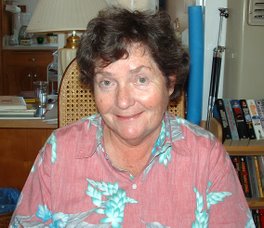A scapegoat, according to Leviticus 16, carries the sins and transgressions of the people, and is let go in the wilderness. A second goat is slaughtered as a sin offering. The scapegoat is a domestic animal, incapable of sin, incapable of breaking laws. The high priest transfers the guilt of that year's confessed transgressions onto the goat. A person is appointed to lead the goat to the desert or lonely mountains, the wilderness, and release it. Presumably the goat will be eaten by a predator. Thus the sins of the people are consumed, destroyed.
How long this custom was followed, and where, and with what result, I do not know.
Yearly, symbolic eradication of sin has been practiced by many cultures. Some indigenous Mexican and Andean groups gather around a fire to speak their responsibility for harm to others. Apology, restitution and forgiveness allow the group to stay together for the benefit of all. Sometimes, just before Lent, my congregations would write on slips of paper their regrets, resentments, failings. We put them, folded and unread, into a hibachi, burned them, and used the ashes on Ash Wednesday. New Year's celebrations carry a theme of death and rebirth, of starting afresh, leaving last year's negative baggage behind. This can support the courage to tackle life's problems and injustices again, and to change our behavior for the better.
Today, a scapegoat is a person or group who bears the blame for others. Often this means blaming the victim; for instance, a person who feels guilty for inappropriate sexual feelings or behavior, even sexual assault, may blame the person desired. The psychic mechanism of projection is involved. People project their own guilty desires onto an ethnic or racial group, and mistreat or punish members of the other group. They blame others for their own lack of success. Scapegoating has been used deliberately and cynically as a political or economic tool to consolidate power or distract from one's own misdoings. There can be no restitution, no rebirth, no clearing of the air and refocusing of effort accomplished by scapegoating.
I think lying is a different matter. "I didn't do it...He did it," is not projection, but self protection, an attempt to escape from responsibility or punishment. It may at times express malice. The person knows what's true. Scapegoating involves lying to one's self. Being scapegoated can make a person very insecure and angry at the same time. It's destructive to individuals and to society. At its worst, scapegoating leads to genocide.
Just Learning

Kitchen Studio
Monday, July 30, 2007
Sunday, July 29, 2007
Scapegoats
I recommend History on Trial. Deborah E. Lipstadt is Dorot Professor of Modern Jewish and Holocaust Studies at Emory University. I haven't read her book yet: History on Trial: My Day in Court with David Irving [Ecco 2005]. David Irving had sued the professor for libel, for calling him a holocaust denier. She won. I'm sorry to say that I didn't recognize either name. My reaction to newspaper stories about people denying that the Holocaust ever happened has been a bafflement. I dismiss them as nuts. That does not stop the damage they can do.
In the book I liked so much by May Sarton, The Education of Harriet Hatfield, some people in the neighborhood react to her new bookstore with a lot of grumbling about "pornography" and "lesbians" and "we don't want her kind here." This quickly escalates to vandalism, threats, and violence. The atmosphere of permission to hate and harm promotes criminal action. Harriet's standing her ground wins respect, and helps others.
"...When they came for the Jews, we did nothing.....When they came for us, there was no one left to do anything."
In the book I liked so much by May Sarton, The Education of Harriet Hatfield, some people in the neighborhood react to her new bookstore with a lot of grumbling about "pornography" and "lesbians" and "we don't want her kind here." This quickly escalates to vandalism, threats, and violence. The atmosphere of permission to hate and harm promotes criminal action. Harriet's standing her ground wins respect, and helps others.
"...When they came for the Jews, we did nothing.....When they came for us, there was no one left to do anything."
Saturday, July 28, 2007
Flickr
Two sets of my photos are now posted on Flickr.com under the name morphit1941, which refers to making changes in shape (No, not dieting. I wish!)and to my date of birth. You can view them now. To make comments or download, you sign up for a free Yahoo account. To comment on THIS blog, you accept a free gmail account. This gives you ID and passwords.
Labels:
Flickr,
Google gmail comments,
photos,
Yahoo
Cool Water
Today I ventured into the small, kidney-shaped pool in the patio. Coolness surrounded me, under a bright sun. I love to watch the shadows of ripples moving on the green-blue pool bottom. I move slowly, stretching, walking, swirling, finally floating. I feel so secure when water holds me up, cool on my skin while the sun is warm on my face.
Of course, it is lovely to float at the shore, far more dynamic, sometimes getting an unwelcome splash of salty wavelet up my nose. Noisier, too. Exciting.
I've just finished reading The Education of Harriet Hatfield, by May Sarton. A 60 year old woman opens a bookstore and learns a lot about herself and other people. When the story ended, I felt cool and secure, as I did in the pool. New life can arise out of familiar elements.
Of course, it is lovely to float at the shore, far more dynamic, sometimes getting an unwelcome splash of salty wavelet up my nose. Noisier, too. Exciting.
I've just finished reading The Education of Harriet Hatfield, by May Sarton. A 60 year old woman opens a bookstore and learns a lot about herself and other people. When the story ended, I felt cool and secure, as I did in the pool. New life can arise out of familiar elements.
Friday, July 27, 2007
Berries and Angelcake
Hot summer days suddenly mean ripe berries - very ripe berries. The local supermarket has been unloading the best, ripest strawberries I've ever seen at the lowest price I've ever seen. Big, crimson and deeeep red strawberries that taste wonderful.
A friend has been nagging me to approach a neighbor about gathering some of the black mulberries that are just falling all over the sidewalk. We got permission, and picked some today. We should have worn raincoats. Black mulberries grow on a tree with low, spreading branches. I reached up to pick a beauty, and brilliant red-purple juice flowed down my hand and arm. It was like picking blackberries as a little kid, eating two for every one that made it into the container, giggling and making a glorious mess. Black mulberries taste a little like concord grapes. They're almost a sweet wine when they're as ripe as this.
So then I went back to the supermarket and bought more strawberries, and angelcake. Nuff said.
A friend has been nagging me to approach a neighbor about gathering some of the black mulberries that are just falling all over the sidewalk. We got permission, and picked some today. We should have worn raincoats. Black mulberries grow on a tree with low, spreading branches. I reached up to pick a beauty, and brilliant red-purple juice flowed down my hand and arm. It was like picking blackberries as a little kid, eating two for every one that made it into the container, giggling and making a glorious mess. Black mulberries taste a little like concord grapes. They're almost a sweet wine when they're as ripe as this.
So then I went back to the supermarket and bought more strawberries, and angelcake. Nuff said.
Labels:
angelcake,
kid,
mulberries,
strawberries,
summer
Monday, July 23, 2007
Wind Power
Windmills in the sky, "Flying Windmills," have been demonstrated by Australian professor Bryan Roberts to be practical.
"When the United States realizes that high altitude wind energy is capable of being its most economical energy source, market forces will lead to its gradually supplanting oil and to energy independence - as well as end the debate on global warming - because its most economical energy source will produce no greenhouse gases."
What a wonderful promise that is. My first thought was that a tethered high altitude "windmill," actually a kind of four-rotor helicopter, would interfere with airplane flights. However, the amount of restricted air space required is not that vast. Balloons are already tethered as high as 15,000 feet to detect drug flights, according to David Shephard, president of Sky WindPower Corporation, based in San Diego.
Wind farms exist now. There's an American Wind Energy Association, a National Renewable Energy Laboratory, a Department of Energy project called Wind Powering America.
A couple of years ago, I heard a spokesman for a tribe in the Dakotas that was building a wind farm to make electricity for themselves, and to sell. He said, "The federal government was generous enough 100 years ago to set aside for us land that has a great deal of the natural resource, wind."
"When the United States realizes that high altitude wind energy is capable of being its most economical energy source, market forces will lead to its gradually supplanting oil and to energy independence - as well as end the debate on global warming - because its most economical energy source will produce no greenhouse gases."
What a wonderful promise that is. My first thought was that a tethered high altitude "windmill," actually a kind of four-rotor helicopter, would interfere with airplane flights. However, the amount of restricted air space required is not that vast. Balloons are already tethered as high as 15,000 feet to detect drug flights, according to David Shephard, president of Sky WindPower Corporation, based in San Diego.
Wind farms exist now. There's an American Wind Energy Association, a National Renewable Energy Laboratory, a Department of Energy project called Wind Powering America.
A couple of years ago, I heard a spokesman for a tribe in the Dakotas that was building a wind farm to make electricity for themselves, and to sell. He said, "The federal government was generous enough 100 years ago to set aside for us land that has a great deal of the natural resource, wind."
Labels:
Dakotas,
high altitude wind,
tribe,
wind power
Recherches
Imaginary conversation:
"You shouldn't dwell on the past. What's done is done. Forget about it."
"Tell that to Marcel Proust."
"You shouldn't dwell on the past. What's done is done. Forget about it."
"Tell that to Marcel Proust."
Friday, July 13, 2007
Friday the Thirteenth
So far, Friday the Thirteenth has been a good day. My family is well. I got in touch with two old friends. I took part in a self-help meeting. I ate cantaloupe, Kashi, and yogurt. Because it's warm, dry weather, yesterday and today I drank a gallon of water each. I like four parts cold water with one part concentrated iced tea and the juice of half a key lime. Another good one is four parts water with one part orange juice. Stay hydrated, friends.
Labels:
cool drinks,
F the 13th,
hot weather,
old friends
Saturday, July 7, 2007
Family History
Family history enlivens the past, enlightens the present.
Everyone shares the family history of humankind. Personal family history includes the decisions, actions and attitudes in the recent past, and the present, of people who influence our own ways of being. Some of these people are biological relatives, some adopted, whether formally or informally. A parent's close friend, or hot enemy, may have as much impact on a family as kin. Public figures that were or are much admired tell us of family aspirations and ideals. The early loss of a parent, the loss or gain of a job, or the management of a business can impact several generations. So can the effect of an era, such as the Great Depression of the 1930's, or the counter-culture movements of the 1960's.
Nature and nurture work together in each person's development. Humans are social beings, generalists, extremely adaptable. They are also loners, specialists, and rigid.
We are not limited by our genetic and social givens, but they do give a structure on which we build a life by our choices today.
Everyone shares the family history of humankind. Personal family history includes the decisions, actions and attitudes in the recent past, and the present, of people who influence our own ways of being. Some of these people are biological relatives, some adopted, whether formally or informally. A parent's close friend, or hot enemy, may have as much impact on a family as kin. Public figures that were or are much admired tell us of family aspirations and ideals. The early loss of a parent, the loss or gain of a job, or the management of a business can impact several generations. So can the effect of an era, such as the Great Depression of the 1930's, or the counter-culture movements of the 1960's.
Nature and nurture work together in each person's development. Humans are social beings, generalists, extremely adaptable. They are also loners, specialists, and rigid.
We are not limited by our genetic and social givens, but they do give a structure on which we build a life by our choices today.
Labels:
family history,
nature/nurture,
personal influences
Friday, July 6, 2007
The Power of Free?
In The Long Tail, Chris Anderson says, "Understand the power of free...one of the most powerful features of digital markets is that they put free within reach; because their costs are near zero, their prices can be, too. Already, one of the most common business models on the Internet, from Skype to Yahoo! Mail, is to attract lots of users with a free service and convince some of them to upgrade to a subscription-based 'premium' service that adds higher quality or better features. Because digital services are so cheap to offer, the free customers cost the company so little that it can afford to convert only a tiny fraction of them to paying customers." (p. 223)
I think that the costs can be near zero only after considerable investment in startup for labor and advertising. Startup can take months and years, so there must be money to support the effort for some time. Alternatively, the labor can be unpaid and the equipment can be the personal property of the entrepeneurs, who keep their day jobs.
Internet services can stimulate physical services. Buying and selling on eBay has caused an explosion in mail and parcel delivery services. eBay always charged fees to sellers, but this has proved affordable for quite a few businesses and individuals. I wonder, what is the proportion of successful to unsuccessful sellers?
Returning to the theme of free services, I used to check SciFi.com regularly to read new and classic SF stories at no cost. The site is connected to a television channel, and its reviews of films, books and other products stimulates sales of those items. I'm more likely now to check recent interviews with authors, as well as reviews. I might base a decision to see a movie partly on SciFi's review, or be reminded of a book and look on Amazon or ExLibris or Abebooks for an inexpensive copy. Multiply my modest spending by a million viewers, add the big spenders, and the free service deserves to be paid by advertisers.
The wonderful world of the Web and the Internet is not exactly without cost. Where is all this electricity coming from? Mostly from oil and coal, I find. What does it contribute to environmental challenges? Lots and lots of heat, damming of streams, noxious minerals in discarded electronic equipment.
I think rejection of Anderson's economics of abundance arises from misunderstanding. It cannot be extended to all of the existing global economics.
What can be extended globally is free access to information and communication. That goal requires social and political implementation.
I think that the costs can be near zero only after considerable investment in startup for labor and advertising. Startup can take months and years, so there must be money to support the effort for some time. Alternatively, the labor can be unpaid and the equipment can be the personal property of the entrepeneurs, who keep their day jobs.
Internet services can stimulate physical services. Buying and selling on eBay has caused an explosion in mail and parcel delivery services. eBay always charged fees to sellers, but this has proved affordable for quite a few businesses and individuals. I wonder, what is the proportion of successful to unsuccessful sellers?
Returning to the theme of free services, I used to check SciFi.com regularly to read new and classic SF stories at no cost. The site is connected to a television channel, and its reviews of films, books and other products stimulates sales of those items. I'm more likely now to check recent interviews with authors, as well as reviews. I might base a decision to see a movie partly on SciFi's review, or be reminded of a book and look on Amazon or ExLibris or Abebooks for an inexpensive copy. Multiply my modest spending by a million viewers, add the big spenders, and the free service deserves to be paid by advertisers.
The wonderful world of the Web and the Internet is not exactly without cost. Where is all this electricity coming from? Mostly from oil and coal, I find. What does it contribute to environmental challenges? Lots and lots of heat, damming of streams, noxious minerals in discarded electronic equipment.
I think rejection of Anderson's economics of abundance arises from misunderstanding. It cannot be extended to all of the existing global economics.
What can be extended globally is free access to information and communication. That goal requires social and political implementation.
Labels:
books,
economics,
environment,
free,
scifi,
The Long Tail
Monday, July 2, 2007
WIRED NextFest September 14-16, Los Angeles
Oh, my God! I'm going to NextFest again. Check it out at www.wirednextfest.com. People bring their robots from Japan and from North Carolina. Electric cars, fuel cell cars, systems to grow food inexpensively in sub-Saharan Africa, the vehicle in which the first private space flight was made, little kids drawing on the wall with light -- and that was last year!
I'm ecstatic.
Have you looked up www.robothalloffame.org? Gort, Robbie and C3P10 rule.
I'm ecstatic.
Have you looked up www.robothalloffame.org? Gort, Robbie and C3P10 rule.
Grandpa
Grandpa, William Edgar Grumman, was a schoolteacher, writer and librarian. I never met him, as he died long before I was born. He was old enough to remember the War Between the States, and the older brother who never came back. He loved justice, politics, and education. When Mark Twain donated books to start a library in Redding, CT, Grandpa was in charge of organizing the library, and was its first head. In this photo, circa 1880, his energy and humor show.
Subscribe to:
Posts (Atom)


